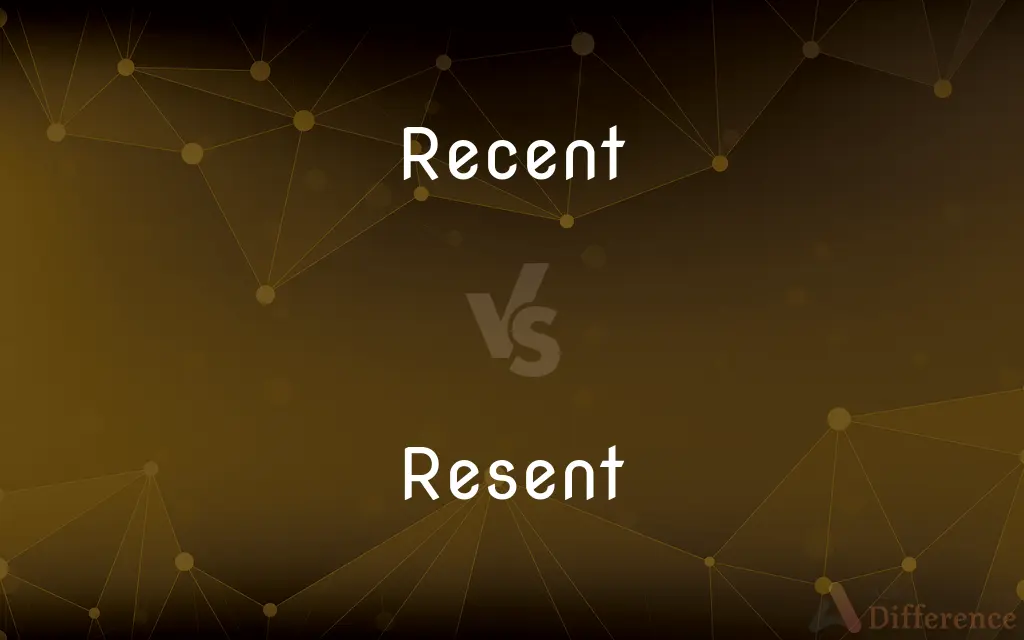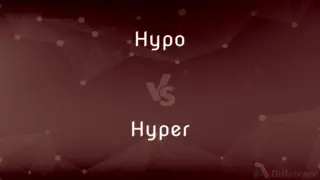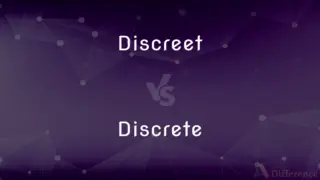Recent vs. Resent — What's the Difference?
Edited by Tayyaba Rehman — By Urooj Arif — Updated on April 23, 2024
Recent refers to something that happened a short time ago; resent involves feeling bitter about something past.

Difference Between Recent and Resent
Table of Contents
ADVERTISEMENT
Key Differences
Recent is used to describe events, developments, or things that occurred not long ago, such as a recent storm. Whereas, resent is a verb that expresses a feeling of bitterness or anger towards someone or something due to past actions.
Recent often appears in contexts discussing time, such as recent history or recent changes. On the other hand, resent typically appears in emotional contexts, referring to harbored feelings of anger or dissatisfaction.
The usage of recent is neutral, implying no emotion but simply indicating proximity in time. In contrast, resent conveys a strong emotional charge, often related to perceived wrongs or injustices.
Recent can apply to a wide range of subjects, including news, discoveries, or personal experiences. Whereas resent is generally used with respect to interpersonal relationships or actions that have caused personal upset.
In language, recent is an adjective modifying nouns to specify a time frame that is close to the present. On the other hand, resent is a verb that requires an object to which the feelings are directed.
ADVERTISEMENT
Comparison Chart
Part of Speech
Adjective
Verb
Context
Temporal, referring to time
Emotional, referring to feelings
Emotional Connotation
Neutral
Negative, associated with bitterness
Usage Examples
Recent events, recent studies
Resent someone’s success, resent an insult
Related Terms
Latest, newest
Begrudge, feel bitter
Compare with Definitions
Recent
Close to the present moment.
The recent weather patterns have been unpredictable.
Resent
To harbor a sense of injury or wrong.
She resented the unfair treatment.
Recent
Just happened or took place.
The team celebrated their recent victory.
Resent
To begrudge something or someone.
He resents his neighbor's success.
Recent
Modern or contemporary.
She is an expert in recent European history.
Resent
To feel bitterness or indignation at.
He resents having to work late.
Recent
Pertaining to a time not long past.
She discussed the recent changes in policy.
Resent
To dislike or be angry about something considered unfair.
She resents the favoritism shown to others.
Recent
Freshly new or updated.
He bought a recent edition of the book.
Resent
To feel unjustly treated or offended.
They resent being overlooked for promotion.
Recent
Having happened, begun, or been done not long ago; belonging to a past period comparatively close to the present
A recent edition of the newspaper
His recent visit to Britain
Resent
Feel bitterness or indignation at (a circumstance, action, or person)
She resented the fact that I had children
Recent
Another term for Holocene
Resent
To feel indignantly aggrieved at.
Recent
The Holocene epoch.
Resent
(transitive) To feel resentment over; to consider as an affront.
The bride greatly resented being left at the church.
Recent
Of, belonging to, or occurring at a time immediately before the present.
Resent
(transitive) To express displeasure or indignation at.
Recent
Modern; new.
Resent
To be sensible of; to feel.
Recent
Recent(Geology) Of, relating to, or being the Holocene Epoch. See Table at geologic time.
Resent
In a positive sense, to take well; to receive with satisfaction.
Recent
Having happened a short while ago.
Resent
(obsolete) To recognize; to perceive, especially as if by smelling; -- associated in meaning with sent, the older spelling of scent, to smell. See resent (intransitive verb).
Recent
Up-to-date; not old-fashioned or dated.
Resent
(obsolete) To give forth an odor; to smell; to savor.
Recent
Having done something a short while ago that distinguishes them as what they are called.
The cause has several hundred recent donors.
I met three recent graduates at the conference.
Resent
Simple past tense and past participle of resend
The package was resent, this time with the correct postage.
Recent
(sciences) Particularly in geology, palaeontology, and astronomy: having occurred a relatively short time ago, but still potentially thousands or even millions of years ago.
Resent
To be sensible of; to feel
Which makes the tragical ends of noble persons more favorably resented by compassionate readers.
Recent
Of the Holocene, particularly pre-21st century.
Resent
In a bad sense, to take ill; to consider as an injury or affront; to be indignant at.
Recent
An earlier term for the Holocene.
Resent
To express or exhibit displeasure or indignation at, as by words or acts.
The good prince King James . . . bore dishonorably what he might have resented safely.
Recent
Of late origin, existence, or occurrence; lately come; not of remote date, antiquated style, or the like; not already known, familiar, worn out, trite, etc.; fresh; novel; new; modern; as, recent news.
The ancients were of opinion, that a considerable portion of that country [Egypt] was recent, and formed out of the mud discharged into the neighboring sea by the Nile.
Resent
To feel resentment.
Recent
Of or pertaining to the present or existing epoch; as, recent shells.
Resent
To give forth an odor; to smell; to savor.
The judicious prelate will prefer a drop of the sincere milk of the word before vessels full of traditionary pottage resenting of the wild gourd of human invention.
Recent
Being new in a time not long past;
Recent graduates
A recent addition to the house
Recent buds on the apple trees
Resent
Feel bitter or indignant about;
She resents being paid less than her co-workers
Recent
Of the immediate past or just previous to the present time;
A late development
Their late quarrel
His recent trip to Africa
In recent months
A recent issue of the journal
Resent
Wish ill or allow unwillingly
Recent
Near to or not long before the present;
Recent times
Of recent origin
Common Curiosities
Can resent be positive?
No, resent typically has negative connotations associated with bitterness or anger.
How is resent used in a sentence?
Resent is used as a verb to express feelings of bitterness or anger, for example, "She resents not being promoted."
What types of nouns does recent modify?
Recent modifies nouns related to time such as events, updates, and changes.
What is the primary usage of recent?
Recent is primarily used as an adjective to describe something that happened not long ago.
What emotions are associated with resent?
Resent involves emotions like bitterness, anger, and indignation.
What is an example of resent affecting relationships?
An example could be harboring resentment towards a friend for a past betrayal.
Is resent always related to past events?
Yes, resent generally involves feelings related to past actions or experiences.
Can recent refer to future events?
No, recent exclusively refers to past occurrences that are close to the present.
How can recent be identified in a sentence?
Recent can be identified as an adjective that modifies nouns indicating recent time frames.
How does resent relate to forgiveness?
Resent can indicate a lack of forgiveness, where the individual holds onto negative feelings.
What is a typical context for using recent?
Typical contexts include discussions on recent developments or recent news.
What synonyms could replace resent?
Synonyms for resent include begrudge, feel bitter, or feel aggrieved.
How do recent and resent differ in emotional impact?
Recent is emotionally neutral, while resent carries a significant negative emotional impact.
Can resent be used without an object?
No, resent typically requires an object to which the feelings are directed.
Is recent related to specific times?
Yes, recent refers to periods close to the current time but does not specify an exact duration.
Share Your Discovery

Previous Comparison
Hypo vs. Hyper
Next Comparison
Discreet vs. DiscreteAuthor Spotlight
Written by
Urooj ArifUrooj is a skilled content writer at Ask Difference, known for her exceptional ability to simplify complex topics into engaging and informative content. With a passion for research and a flair for clear, concise writing, she consistently delivers articles that resonate with our diverse audience.
Edited by
Tayyaba RehmanTayyaba Rehman is a distinguished writer, currently serving as a primary contributor to askdifference.com. As a researcher in semantics and etymology, Tayyaba's passion for the complexity of languages and their distinctions has found a perfect home on the platform. Tayyaba delves into the intricacies of language, distinguishing between commonly confused words and phrases, thereby providing clarity for readers worldwide.














































